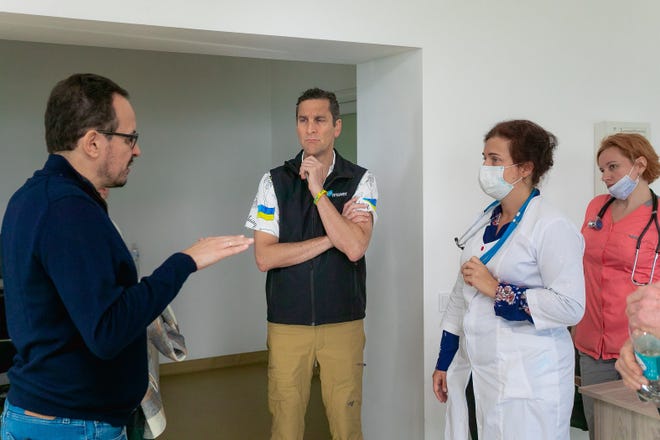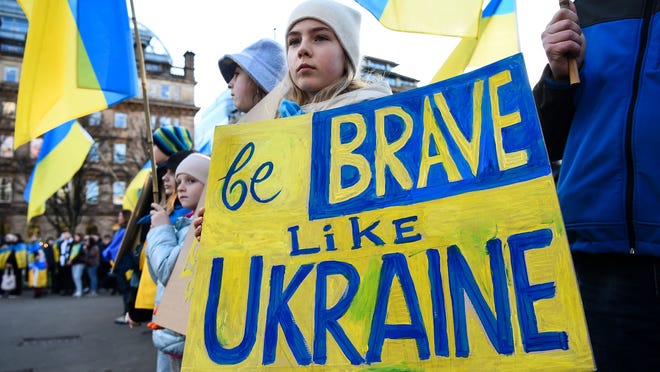Making his daily rounds, Dr. Oleh Berezyuk admittedly tried his hardest to downplay Feb. 24 as just another day.
The psychiatrist and psychotherapist didn’t want to appear somber or overly reflective on the one-year mark of the unprovoked Russian invasion of Ukraine. He didn’t want to further disrupt the mental states of his patients suffering from PTSD and other stress-related conditions.
He also hadn’t heard any air raid sirens – yet.
“Right now, we are not counting them; we used to,” said Berezyuk, the director of the first-of-its-kind mental health center in Lviv. “(The sirens) are a part of our lives now. We know how to respond. Today is a peaceful day – so far.”
As the war enters its second year, the 5-month-old center shows how Ukraine is making mental health a big-picture priority in the midst of a deadly conflict the world is watching.
For Berezyuk, the work is personal.
He visited the room of a soldier with a traumatic brain injury after at least 15 concussions since the Russian invasion. Next, Berezyuk checks on another soldier who had his lower limbs amputated from battling in combat.
About a third of the center’s patients have participated in the Ukrainian military, Berezyuk said. The doctor pauses, then takes a deep breath, knowing that the work of his team of fellow physicians to heal their patients’ spirits must go on.
“We are doing our jobs. Nothing more, nothing less,” Berezyuk said. “We have adapted to war and the challenges that come with it.”

Ukrainians’ well-being in the spotlight
According to the World Health Organization, 1 in 5 people (22%) who live in a region affected by conflict in a 10-year period is estimated to have some mental health condition ranging from mild depression, anxiety, bipolar disorder or psychosis. In relation to the conflict in Ukraine, the WHO estimates that as many as 9.6 million people may have a mental health condition, of whom 3.9 million may have needs that are moderate or severe.
Ukrainians’ well-being has become a focal point for Ukrainian first lady Olena Zelenska who is working with the WHO to create a mental health and psychosocial roadmap with the input of more than 1,000 experts worldwide to help strengthen her country’s mental health system.
Last month, WHO’s Regional Director for Europe Dr. Hans Henri P. Kluge tweeted that Zelenska summed up the situation in Ukraine: “Everyone in society has to become a psychologist.” Kludge said the ongoing war is placing “an enormous strain on the mental health and well-being of all Ukrainians, and it’s vital we begin addressing this now.”
Those sentiments are shared by Berezyuk and other local leaders in Lviv — a city with a population of about 700,000 that was once considered a safe haven but is now a frequent target for Russian forces — to push for a facility focusing on mental health.
“For us, it’s very important to have such staunch support,” Berezyuk said. “But we can’t do it by ourselves. We need help.”
Ukraine mental health center is ‘not some makeshift operation’
Officially known as the Lviv Mental Health Center, the 5,000-square-foot renovated space offers free and low-cost services from about a dozen professional psychotherapists and psychiatrists. The goal is to treat wounded Ukrainian soldiers and locals suffering from PTSD and other stress-related conditions brought on by the war.
“This is not some makeshift operation,” JustAnswer founder and CEO Andy Kurtzig told USA TODAY. A bulk of the costs to construct the mental health center in Lviv came from Kurtzig and his wife Sara’s nonprofit the Arizae Foundation.
He projects the mental health center will conduct more than 40,000 consultations in 2023.
Housed in a reconstructed building, both the mental health center and a rehabilitation center that shares the same space are adjacent to the Lviv Emergency City Hospital, which previously served as a general health clinic for non-urgent care.
SUPPORT FOR GIVING UKRAINE WEAPONS FADE:A majority of the Russian army is now in Ukraine
US TECH CEO TAKES FAMILY TO HELP UKRAINE:Tech CEO and family spend spring break helping colleagues in war-ravaged Ukraine
Lviv’s mental health center receives both local government and private funding, including from the Lviv IT Cluster, a local trade organization renowned for its charity work, Berezyuk said. The center has 15 rooms for individual and group therapy sessions.
Many patients arrive by train from eastern Ukraine, where much of the war’s hostile activities occur, Berezyuk said, adding that Thursdays, Fridays, and Saturdays are usually big days for patient admissions. Berezyuk and his team have set out to ensure patients meet a psychotherapist or psychiatrist usually within a day after arrival.

A critical time for providing services
The mental health center’s presence comes as Ukraine’s Minister of Health Viktor Liashko recently said that more than 1,200 health care institutions across the country have been damaged because of the war.
This includes 540 hospitals partially destroyed and 173 completely ruined, Liashko told media outlet Ukrinform.
The health minister also said the World Bank and the WHO estimate the losses to Ukraine’s health care system to be in the tens of billions of dollars. The most recent figure they presented in September was around $26 billion.
Liashko said restoring some of those structures to pre-pandemic condition could cost upward of $1 billion.
US HAS SPENT BILLIONS ON UKRAINE WAR AID: But is that money landing in corrupt pockets?
BIDEN’S SURPRISE VISIT TO UKRAINE:How President Biden pulled off a secret trip to Ukraine one year into Russia’s war

Berezyuk told USA TODAY that the mental health center has become a “life-saving tool” as more than a third of patients who use it are military personnel suffering from depression, PTSD, anxiety, and psychosomatic disorders.
Berezyuk, a former Ukrainian politician, hopes the center will have more advanced psychotherapeutic tools for cognitive behavioral therapy, EMDR, prolonged exposure therapy, body-oriented therapy, art therapy, and psychodynamic therapy.
He also wants to get more staff onboard as well.
“Working in the difficult conditions of war and helping people with severe reactions to war trauma, we must pay more attention to the health of the employees of our center, preventing the development of secondary PTSD and burnout,” Berezyuk said.
Expert: Ukraine upgrading its mental health system during war is rare
The fact Ukraine is taking the steps to strengthen its mental health system in multiple ways during an ongoing war is rare, said Michelle Engels, a mental health and psychosocial support advisor for International Medical Corps, a humanitarian group that is providing medical and mental health services in Ukraine.
“It’s incredibly ambitious as you often don’t see that in active conflict,” Engels said.
Engels is a clinical psychologist currently leading a Kyiv-based team of psychologists and social workers helping Ukrainians cope with the war. Her organization is partnering with the country’s Ministry of Health to also offer mobile mental health training to local first responders and non-health specialists.
This may include helping traumatized residents with stress management techniques, and breathing exercises to “help keep them grounded amid chaos,” Engels said.
There is a need for mental health resources across Ukraine, said Abraham Flaxman, a global health professor at the University of Washington.
“In some ways, you really can’t call what Ukrainians are going through post-traumatic stress because they are in the midst of this continuous stress,” said Flaxman, who was a data scientist on the international team that compiled the latest war-related mental health statistics for the WHO.
While Engels said her organization is usually going from region to region, she appreciates that a mental health center in Lviv can also provide access to Ukrainians navigating an overwhelming environment. She said a similar mental health center opened in the city of Bucha, near Kyiv, in August that also has governmental backing.
“There is a unique momentum to see such community-based care here,” said Engels who’s been on mental health response missions in other war-torn countries including Iraq, Turkey, and Syria in her 20-year career. “This is not something you see in every country.”
UKRAINE WAR WEARING ON THE US:As Americans grow weary of the Ukraine war, Biden marked the Russia invasion milestone
US WANTS CHINA TO STEER CLEAR OF UKRAINE:As war in Ukraine continues, US officials warn Beijing to stay out of it
While not unparalleled to those other afflicted nations, the mental health crisis in Ukraine is also with cause. According to the United Nations Office of the High Commissioner for Human Rights, more than 8,000 civilians have been killed and more than 13,000 injured since Russia invaded Ukraine a year ago.
Engels said it’s unfair to compare Ukraine’s mental health strategy with other war-torn environments.
“I think you really can’t. An atrocity is an atrocity because there are so many human rights abuses, trauma, and terror in the other countries I’ve worked in,” Engels said. “Unfortunately, Ukraine is no exception.”
‘Our mental health will be a part of our survival’
Berezyuk said since the mental health center in Lviv opened in October, at least four smaller community clinics have also opened across the city.
“Communities are the most important part of the healing process,” Berezyuk said.
Flaxman, the University of Washington health professor, praises Berezyuk, Kurtzig and many others who are putting their resources into an “underappreciated and overlooked” area of health.
“This is the most dire of situations,” Flaxman said. “So any resources, be it public, private, and philanthropic, will be valuable for Ukraine for many years to come.”
Berezyuk hopes so. “The war is making us stronger and we will survive and win. Our mental health will be a part of our survival,” he said.








GIPHY App Key not set. Please check settings